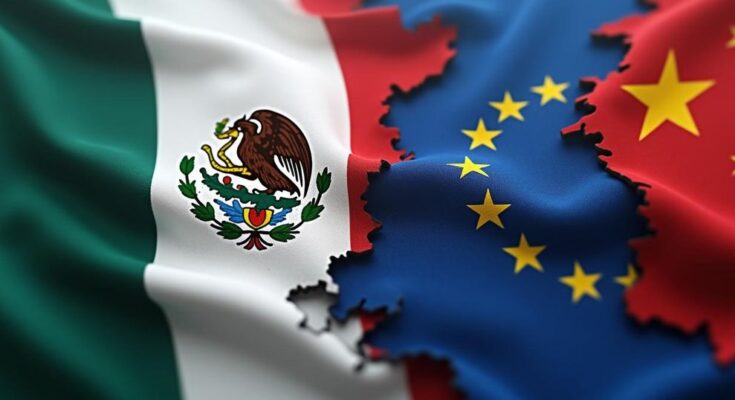In a recent interview, former President Donald Trump discussed his trade policy plans if re-elected, claiming that the U.S. has been unfairly treated in trade deals by Mexico, China, Canada, and the EU. He emphasized a commitment to renegotiate the USMCA and proposed imposing a 200% tariff on Chinese auto imports from Mexico. Trump criticized past trade agreements like NAFTA and highlighted the need for better outcomes for American workers. He recounted successes during his presidency and reaffirmed his hard stance on foreign trade practices.
In a recent interview on “Sunday Morning Futures,” former President Donald Trump articulated his plans regarding international trade should he win the upcoming election. Emphasizing a need for renegotiation of trade agreements, Trump specifically blamed Mexico, China, Canada, and the European Union for unfavorable trade practices that he claims have “screwed” the United States. During the interview with host Maria Bartiromo, Trump mentioned a unique clause in the USMCA which allows him to pursue renegotiations, stating, “Who else would think of that except a business person? A good one — I’m a really good business person.” As a part of his trade strategy, Trump proposed to revamp the existing U.S.-Mexico-Canada Agreement (USMCA), with an aim to stimulate domestic job growth and reinvigorate the auto industry. Trump reiterated his commitment to imposing a substantial 200% tariff on Chinese auto imports from Mexico, asserting that this measure would render them “un-sellable” in the U.S. market. The former president highlighted the significant role of Mexico in the U.S. automotive parts market, where it serves as the largest source of exports and noted an increase in Mexico’s share of U.S. auto parts imports from 38% in 2017 to 42.5% in 2023. Additionally, Trump emphasized his intention to ensure better outcomes for trade negotiations moving forward, stating, “I want to make it a much better deal. I want to take advantage now of the car industry.” Moreover, Trump criticized the North American Free Trade Agreement (NAFTA) and asserted the need to eliminate it due to its purported deficiencies. He recalled instances of administrative mistakes in the agreement that have persisted uncorrected for decades, citing, “Do you know, when they signed NAFTA many years ago, they made typos, and they made mistakes in the agreement that normally you would just sit back and change the following day.” In addition to these remarks, Trump reflected on his achievements during his presidency, touting successful trade agreements with Japan and South Korea and insisting that under his leadership, Iran faced economic hardships. He concluded his thoughts by emphasizing his hardline stance on China, stating that he would jeopardize business relations should they purchase oil from Iran.
Former President Donald Trump’s rhetoric against trade agreements links back to his administration’s focus on prioritizing American economic interests. His critical stance on international trade deals, particularly NAFTA and agreements with countries like China and Mexico, has been a consistent theme throughout his political narrative. Trump’s approach centers around the idea that past administrations have allowed unfavorable conditions that hinder American industry and jobs. The renegotiation of trade deals is a keystone of his policy proposals, which he argues are designed to rectify perceived injustices against American businesses and workers, particularly within the automotive sector. Furthermore, Trump’s strong position on tariffs reflects a larger strategy aimed at protecting American manufacturing from foreign competition.
In conclusion, Donald Trump’s recent remarks highlight his determination to renegotiate critical trade agreements that he believes have been detrimental to the United States. His proposals aim at revamping the USMCA and imposing hefty tariffs on foreign imports, particularly from China. Trump’s approach underscores a broader commitment to American economic interests, with a focus on protecting and revitalizing key industries such as automotive manufacturing. His critique of past trade agreements, particularly NAFTA, alongside his claims of having been a successful negotiator during his presidency, encapsulate his strategy moving forward into the 2024 election campaign.
Original Source: www.foxnews.com




